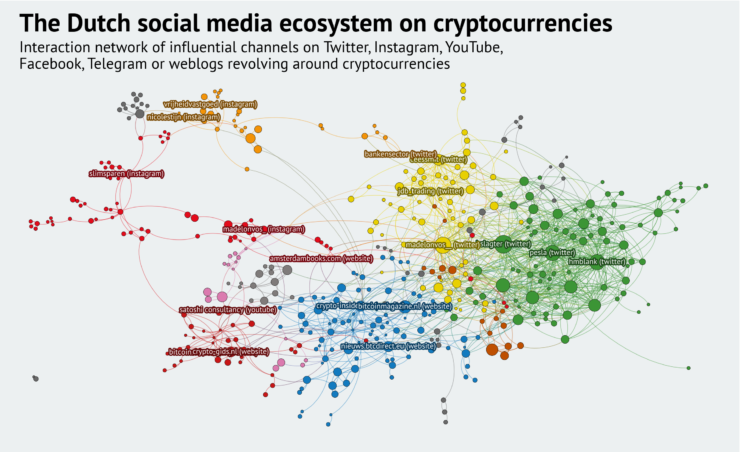Expertise
Over the past years, Data School has carried out several research projects where we were investigating communication patterns and fragmented audiences on social media. Examples for these projects are our inquiry into the Hydroxychloroquine debate, the media consumption choices of Dutch farmers, or debates on datacenters. In addition, we had worked with external partners who were interested in learning about the dynamic of fragmented audiences, knowledge dissemination, and their own communication activities, either on social media or elsewhere.
Each of these phenomena alone was just a symptom of the structural transformation our public sphere is facing. We were interested in a common denominator of these different debates to identify the underlying structural transformations rather than describing symptoms. One aspect that we found in most of our examples was polarization and a politicized framing of expertise.
We found in most of our examples a polarization and a politicized framing of expertise. We also found that the quality of online debates is very much shaped by the platform and its affordances. A debate on a topic-oriented web forum is quite different from the same debate on social media. In all examples we found an intrinsic connection to reporting in established media. Our research indicates that the dynamics of social media conversations, the broad participation of general audiences changes the appearance of expertise within these debates. Knowledge institutions, media and policy need to find ways to interact appropriately with online audiences.
This research was supported by ClickNL, De Groene Amsterdammer and EMMA.
About the work packages
Team lead: Mirko Tobias Schäfer
Team: Lea Stöter & Hugo Bezombes
This work package identifies who acts as and who is recognized as an expert in different online platforms, how they signal expertise, how different topic communities claim and appropriate their expertise, and how central user accounts are instrumental in disseminating it. expertise is perceived differently, and not necessarily connected to specialized knowledge in the fragmented audiences of various topic communities. Drawing from the established theories of expertise, we propose a novel framework that allows us to distinguish different participants that appear as experts within these social media debates. Locating participants along three axes, specialized knowledge, assigned status, and projection of expertise accounts aptly for the diversity we encounter in these debates. Our attempt to develop ‘quantifiable’ indicators for the position of participants within a debate along the three dimensions of Assigned Status, Projection of Expertise, and Specialized Knowledge might enable platform providers for developing apt analysis tools to identify undesirable dynamics of disseminating misinformation, or to indicate the quality of a debate or topic community. While attempts to indicate quality contributions are now following a dated understanding of expertise through highlighting established knowledge or media institutions, our model could help to focus on specialized knowledge, hence expertise which might be also acquired independent from any established knowledge institution.
More about this workpackageThis work package looks at crypto currency discourses on different web for and social media. It asks how distinct knowledge about crypto currencies is produced and disseminated.
Team lead: Joris Veerbeek, Lisa de Graaf
Team: Sofie de Wilde de Ligny; Joris Veerbeek, Lisa de Graaf
The discourse on crypto is presented in different media by different voices. This work package analyses how the topic is presented and argued in different media (newspapers, Twitter topic communities, YouTube channels, and web forums). Each of these media addresses different audiences, they chose different angles and topics in covering crypto, and constitute different knowledge on crypto. The project found remarkable distinctions in the presence of specialized knowledge, modes of communication and dissemination of expertise across the different formats.
More about this workpackageThis work package asks how data centers have been imagined and represented by different Twitter publics over time (2020-2022). How have different media helped to inform this imaginary, and which audiences shaped it?
Team lead: Karin van Es
Team: Daan van der Weijden, Jeroen Bakker
Datacenters are the infrastructural backbone of the information society and its data-heavy (web) services. A marginalized topic in our everyday political debates, datacenters constitute several issues that require expertise and subject specific knowledge to communicate and to develop opinion-forming. This research investigates how datacenters are covered in Twitter debates (as an evolving discussion with changing topics and influxes of actors) and how other media are used to inform this debate.
Through a variety of computational methods (incl. text, image, and network analysis) and close readings of communities and tweets, we gain insight into the volatile discussion around datacenters, identifying experts, topic communities, incidents, media coverage and how they are interdependently related.
More about this workpackage



